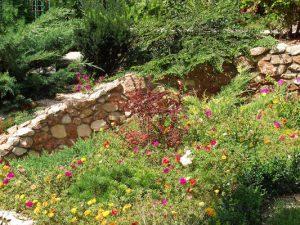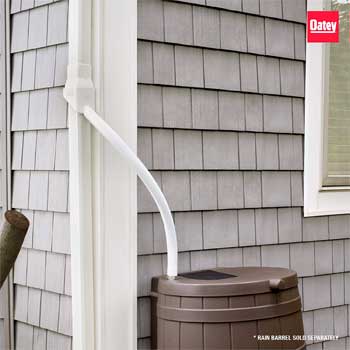
What is a rain garden? In short, the purpose of a rain garden is to improve the environment and prevent environmental hazards. Landscapers design rain gardens into a commercial or residential areas to maximize water usage and/or prevent flooding.
For example, excess runoff from manmade structures such as rooftops, parking lots or walkways diverts into strategically designed landscaped areas. Therefore, instead of causing flooding and erosion problems, excess storm water can soak into the ground.
Have You Seen a Rain Garden Without Even Knowing It?
Well-designed rain gardens can effectively prevent environmental problems (and costs). At the same time, the average person doesn’t even notice them because they are so cleverly disguised. In fact, you’ve probably seen a few yourself and never even knew it!
Where Do You Put a Rain Garden?
Architects typically locate rain gardens on a downward slope and away from structures. In addition, some homes have large open backyards where homeowners can design, excavate and landscape a portion of lot. As a result, you can add native plants with root systems that will absorb the excess water runoff.
But What if You Don’t Have that Much Space?
However, not all properties with rainfall have extra space for a rain garden. Therefore, a vertical rain garden can come in handy. This tall rain barrel looks like a climbing garden wall. Consequently, it looks like a design feature. Plus, it takes up very little ground.
Homeowners can collect excess water runoff from the rooftop as it comes down the gutter downspout. However, instead of water flowing down a driveway or walkway, it is stored in a tall water tank hidden behind plants.
Numerous Advantages of Installing a Rain Garden:
During a heavy storm, higher-than-normal rain levels can cause large hazardous puddles, hillside erosion and other problems. By diverting a significant amount of water out of the way to a safe location, expensive problems can be avoided – and the stored water can be used at a later time to irrigate plants, cutting down on paid water consumption.
In addition to preventing potential flooding or erosion costs and cutting water consumption costs, there is yet another benefit…
Some vertical rain gardens are stylish and sophisticated and can enhance the value of a home simply by appearance (not to mention the other benefits). Keep this factor in minds as you shop for vertical rain gardens, because it’s ideal if you investment can pay for itself, right?

